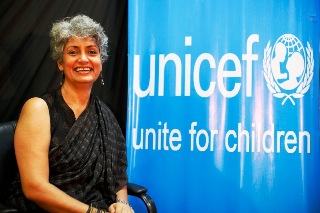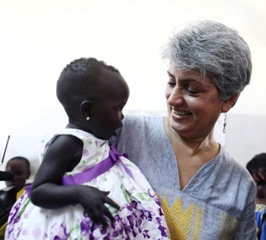FEATURE: Finding perspective in South Sudan – Yasmin’s journey
August 8, 2013 (JUBA) – She’ll smile when she meets you. Stopping you with amber eyes as she warmly shakes your hand, it’s likely she’ll say “it’s nice to meet you” and you’ll feel the simple truth of that sentence as if someone were stating your name.

Meeting Dr. Yasmin Ali Haque, UNICEF South Sudan’s Country Representative, might be intimidating for most if it were not for the immediate and inescapable feeling that she somehow already thinks you are pretty great. For someone as accomplished as her, that approachability and self-possessed calmness is a gift – one given earlier on in her childhood and thankfully protected since.
EDUCATION AND FAMILY BACKGROUND
Born to a Bengali family in West Pakistan, Yasmin understood quickly the importance of identity and culture as she watched her fellow Bengalis break away in their fight for independence. At age 11 she lived for two years in a repatriation camp, before finding home in her then-nascent country of Bangladesh.While at the camp her father, a British-trained doctor, worked with other fathers to establish schools for their children. It was an experience that helped solidify her understanding of the importance education holds for children.
“School was significantly beyond what the lessons taught,” she said recently while meeting in her office, a small pre-fab container in Juba, “it gave us routine and let us understand our culture and community. I’m still in touch with those classmates to this day.”
Training as a doctor in Bangladesh’s largest teaching hospital many years later proved to be another pivotal time.
“We had situations in the women’s ward with two women to a bed, some even on the floor. People would have nothing but their faith and a reliance on systems to help them when needed. It was a lesson in humility and appreciating what I had,” she said.
As UNICEF’s Country Representative for South Sudan, that perspective and rooting in the realities of the world could not be more valuable. Her days buzz by in a never-ending mix of high-level meetings addressing everything from the nitty gritty to the big picture. In a given morning she may review and direct ongoing UNICEF programs, look at initiatives with implementing partners, and then delve into the constantly evolving course of emergency response – assessing both humanitarian and development programming and the linkages between the two.
Over pre-lunch coffee she may drill down in talks with field office heads to review and assess countrywide operations, logistics, and staffing gaps. Lunch usually consists of an orange or apple as she hustles to a meeting with representatives from government and partner organizations to discuss advocacy for a certain issue or monitoring and follow up on a given initiative.
With synergy among the UN circle paramount, her afternoon may be tied to a coordination meeting with another UN mission. Maybe a meeting afterward with a donor in country, and then a Skype call with one abroad. By evening and her third cup of tea she’ll be on the phone with HQ in New York to discuss downstream programs and fundraising gaps.
The pulls on her time and energy are endless: everyone wants her input and many desperately need it. In an emergency context like South Sudan the constant monitoring needed for such high-altitude navigation means that weekends hold little-to-no weight. Months inevitably melt together and time becomes separated only by short punctuations of Rest &Recuperate (R&R) – commas interspersing a run-on sentence of emergencies and high-priority To-Do’s.
In this disorienting mix, staying grounded and maintaining perspective can sometimes become a task. Yet with some of the lowest human development indicators in the world, the stakes for South Sudan could not be higher.
When asked how she stays in touch with realities on the ground, Yasmin said she regularly goes on field visits.
“I cannot advocate for children and women effectively if I haven’t seen it on the ground. I look at the areas where I need to strengthen my understanding and I go there.”

“I learn best by traveling by road – you meet the people, see the environment, see the terrain and markets along the way.”
Such boots-on-the-ground mentality is critical, and a defining component of UNICEF’s work in South Sudan.
“Policies cannot be written in a vacuum,” Yasmin notes, “we have to be like a farmer with arms stretched to the sky and boots in the mud so that we are rooted in reality.”
Functioning in all ten states, UNICEF is uniquely positioned to take experiences and discussions from the field all the way to the policy level. In the country’s first full year of independence, UNICEF has helped South Sudan immunize close to 3.2 million children for polio and registered more than 3,600 unaccompanied and separated children and reunited over 1,200 children with their families. UNICEF has supplied improved drinking water to more than ¼ of a million people and helped finalize key legislation like the General Education Sector Plan.
CHALLENGES
Such progress, however, must be tempered with the myriad challenges still at bay. Countrywide, only 1 out of 5 children finish primary school and 27% of adults can read. 1 in 7 women are at risk of dying during pregnancy or childbirth and 10% of children will die before they reach the age of 5.
“My time here has been just a drop in the bucket,” Yasmin notes modestly about the past three years, “I won’t make claim to any major achievements as I leave. I only hope I have helped set the foundation for systems to be built that will ensure children have access to health and education, peace and justice in a way that’s predictable and respects them.”
NEW ROLES
As our talk winds down I can sense the impending tasks of her day. Standing, I casually ask about her next posting in New York. She stops, takes a breath and tilts her gaze skyward, visibly sifting through the last few years in contemplation of the next.
“It is going to be different,” she says with a laugh that expels any notion of heaviness, “New York will be good, but I’ll miss this place certainly, especially the strength of the people.”
Another moment passes as she looks into the middle distance, quietly reuniting with the countless women and children she has met who have been so vital in guiding the direction of her work. A blink and shake of the head, and she comes back to the two of us standing there in her small office.
“They’ve taught me humility,” she smiles. And with that she nods her head, an acknowledgment to the sea of experience it would take a lifetime to absorb,says goodbye with a hug, and jumps into the rest of her day.
- Adopted from UNICEF South Sudan website
(ST)
